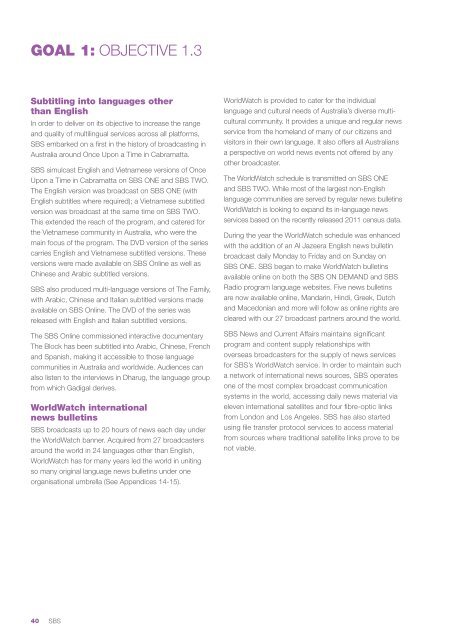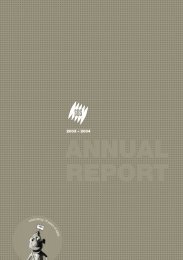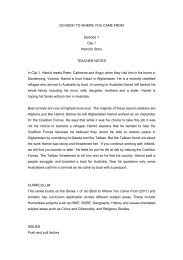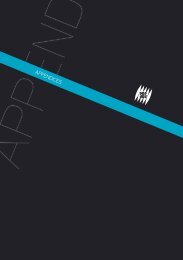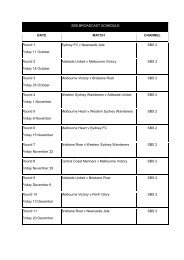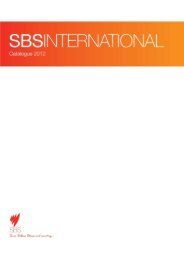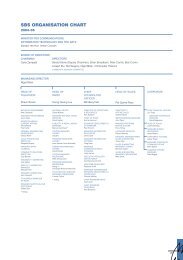AnnuAl REPORT 2011-2012 - Sbs
AnnuAl REPORT 2011-2012 - Sbs
AnnuAl REPORT 2011-2012 - Sbs
- TAGS
- annual
- media.sbs.com.au
You also want an ePaper? Increase the reach of your titles
YUMPU automatically turns print PDFs into web optimized ePapers that Google loves.
Goal 1: Objective 1.3<br />
Subtitling into languages other<br />
than English<br />
in order to deliver on its objective to increase the range<br />
and quality of multilingual services across all platforms,<br />
SbS embarked on a first in the history of broadcasting in<br />
Australia around Once Upon a time in cabramatta.<br />
SbS simulcast english and vietnamese versions of Once<br />
Upon a time in cabramatta on SbS ONe and SbS tWO.<br />
the english version was broadcast on SbS ONe (with<br />
english subtitles where required); a vietnamese subtitled<br />
version was broadcast at the same time on SbS tWO.<br />
this extended the reach of the program, and catered for<br />
the vietnamese community in Australia, who were the<br />
main focus of the program. the DvD version of the series<br />
carries english and vietnamese subtitled versions. these<br />
versions were made available on SbS Online as well as<br />
chinese and Arabic subtitled versions.<br />
SbS also produced multi-language versions of the Family,<br />
with Arabic, chinese and italian subtitled versions made<br />
available on SbS Online. the DvD of the series was<br />
released with english and italian subtitled versions.<br />
the SbS Online commissioned interactive documentary<br />
the block has been subtitled into Arabic, chinese, French<br />
and Spanish, making it accessible to those language<br />
communities in Australia and worldwide. Audiences can<br />
also listen to the interviews in Dharug, the language group<br />
from which Gadigal derives.<br />
WorldWatch international<br />
news bulletins<br />
SbS broadcasts up to 20 hours of news each day under<br />
the WorldWatch banner. Acquired from 27 broadcasters<br />
around the world in 24 languages other than english,<br />
WorldWatch has for many years led the world in uniting<br />
so many original language news bulletins under one<br />
organisational umbrella (See Appendices 14-15).<br />
40 SBS<br />
WorldWatch is provided to cater for the individual<br />
language and cultural needs of Australia’s diverse multicultural<br />
community. it provides a unique and regular news<br />
service from the homeland of many of our citizens and<br />
visitors in their own language. it also offers all Australians<br />
a perspective on world news events not offered by any<br />
other broadcaster.<br />
the WorldWatch schedule is transmitted on SbS ONe<br />
and SbS tWO. While most of the largest non-english<br />
language communities are served by regular news bulletins<br />
WorldWatch is looking to expand its in-language news<br />
services based on the recently released <strong>2011</strong> census data.<br />
During the year the WorldWatch schedule was enhanced<br />
with the addition of an Al jazeera english news bulletin<br />
broadcast daily Monday to Friday and on Sunday on<br />
SbS ONe. SbS began to make WorldWatch bulletins<br />
available online on both the SbS ON DeMAND and SbS<br />
Radio program language websites. Five news bulletins<br />
are now available online, Mandarin, Hindi, Greek, Dutch<br />
and Macedonian and more will follow as online rights are<br />
cleared with our 27 broadcast partners around the world.<br />
SbS News and current Affairs maintains significant<br />
program and content supply relationships with<br />
overseas broadcasters for the supply of news services<br />
for SbS’s WorldWatch service. in order to maintain such<br />
a network of international news sources, SbS operates<br />
one of the most complex broadcast communication<br />
systems in the world, accessing daily news material via<br />
eleven international satellites and four fibre-optic links<br />
from London and Los Angeles. SbS has also started<br />
using file transfer protocol services to access material<br />
from sources where traditional satellite links prove to be<br />
not viable.


